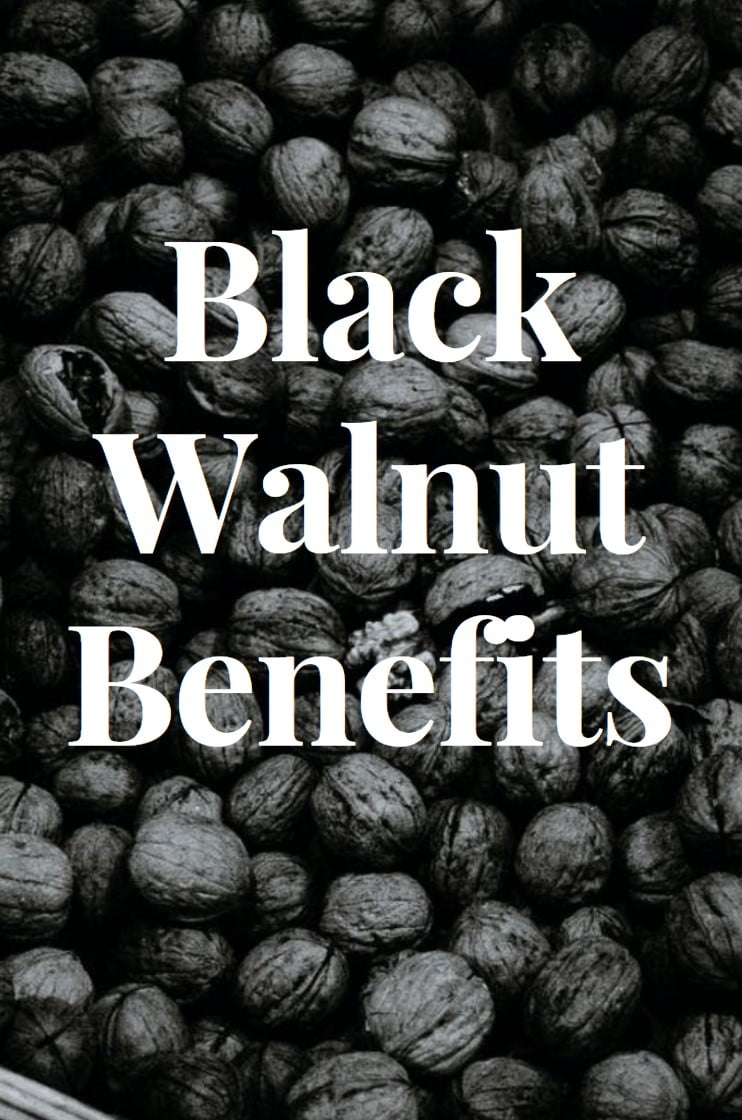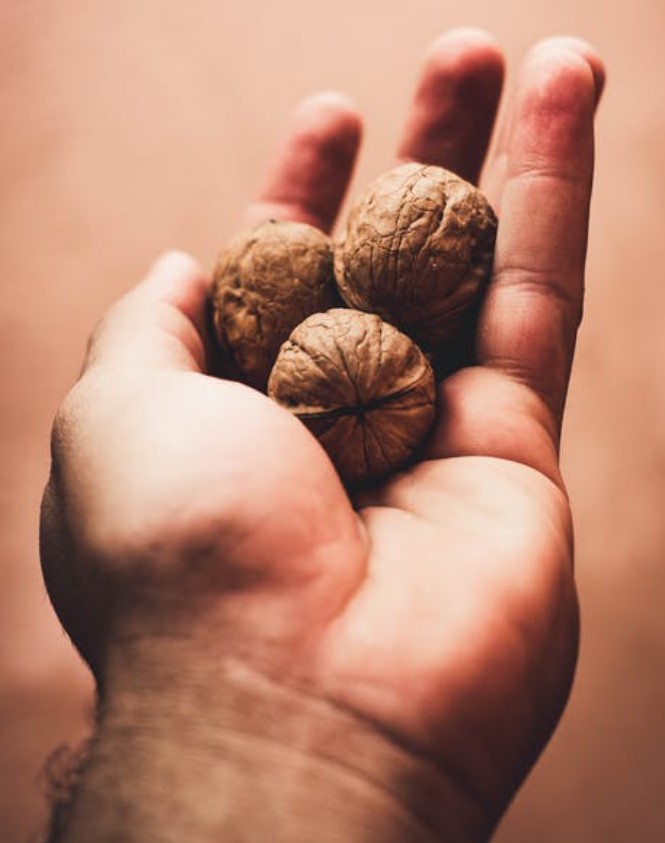Black Walnut Benefits
Last updated on

You may be surprised but black walnut has quite a few health benefits.
Herbal action: antibacterial, antifungal, antiparasitic, antioxidative
Common name: black walnut, eastern black walnut; not to be confused with English walnut (Juglans regia)
Scientific name: Juglans nigra
Family name: Juglandaceae (walnut)
Parts used: bark, nuts, hull
Notable phytochemicals and their features
- Quinones, particularly the naphthoquinone juglone, are responsible for the majority of black walnut’s unique properties
- Phenolic compounds (phenolic acids, tannins, proanthocyanidins) have anti-inflammatory and antioxidative action. Tannins also have significant astringent properties.
- Phytosterols reduce cholesterol absorption in the guts—and therefore blood cholesterol levels. Black walnut is a rich source of phytosterols, packing about 109 mg / 100 g
- Tocopherols (different forms of vitamin E), particularly alpha- and gamma-tocopherol, both of which are easily absorbed and processed by humans. By the way, there are studies indicating that gamma-tocopherol has been linked to a lower risk for prostate cancer.
Medical uses and benefits
The black walnut tree is famous for its allelopathy, meaning that it produces multiple compounds that affect the growth of other organisms (trees in particular), providing walnut with a competitive advantage.
A compound known as juglone is one of the black walnut’s most powerful weapons. Just to give you an idea, just imagine this: trees that are sensitive to the toxic action of juglone can’t grow closer than 50-80 feet from a mature black walnut tree.
The good news is that juglone isn’t toxic to humans and has powerful antibacterial, antifungal, and antiviral properties. According to some studies, creams containing black walnut were as effective in fighting Candida albicans infections as the conventional antifungal drug clotrimazole.
Additional health benefits
Antiparasitic action. The Pharmaceutical Society of Australia mentions that black walnut could be beneficial as a complimentary natural medicine to eradicate intestinal parasites like roundworms and tapeworms. More studies are needed to establish optimal doses for different parasites.
Anti-cancer properties. Juglone, one of the main active compounds of black walnut, has been reported to kill skin cancer (melanoma) and colon cancer cells in several laboratory studies.
Prevent inflammation and gout. Walnut husk is rich in compounds that prevent the buildup of uric acid in the blood by inhibiting an enzyme known as xanthine oxidase. Excess uric acid (hyperuricemia) leads to systemic inflammation and gout, so it seems that black walnut is a fabulous remedy for that!
May protect the liver from heavy metal toxicity. Some animal studies reported that black walnut has hepatoprotective action in lab models of arsenic toxicity, mostly by reducing local inflammation and oxidative stress. More studies are needed to check if this effect works for other heavy metals, as well as if it’s effective in humans.
Great source of omega-3s. Black walnuts are rich in alpha-linoleic acid (ALA), an essential omega-3 fatty acid that plays a vital role in human health. Some of its primary functions include anti-inflammatory action, blood thinning, and immune system balancing.
Rich in valuable nutrients. Black walnuts are a great source of phosphorus (513 mg / 100 g), potassium (523 mg / 100 g), folate (31 mcg / 100 g), and arginine (3.62 g / 100 g).

May help in controlling blood pressure. Black walnuts are rich in arginine, which is transformed into nitric oxide in the body. Nitric oxide is a universal vasodilator, meaning it relaxes and widens the blood vessels, effectively lowering blood pressure. A 2014 study reported that eating 8 black walnuts daily for two days effectively decreased the blood pressure in 130 persons with arterial hypertension.
How to take black walnut
There are two different approaches to taking black walnut.
- To get more of the health benefits associated with juglone, it’s recommended to use black walnut hulls (tinctures, extracts, powders, etc.), as they contain more of the plant’s active phytochemicals
- For the nutritional benefits of black walnuts (minerals, folate, vitamins), just prepare the nuts in whatever way you prefer—and enjoy!
As there have been no reported cases of black walnut toxicity ever (as well as no studies on the plant’s optimal dose for specific health benefits), just approach the matter with common sense and incorporate the nut into your diet as any other food. Most likely, eating 5-8 black walnuts daily should be enough for general health support.
If you decide to go with black walnut supplements, just follow the instructions provided with your product. Every manufacturer follows a different method of processing black walnut, so each product will have a slightly different content of the plant’s active compounds.
Contraindications
- Allergic reactions to plants of the Juglandaceae (walnut) family
- Any allergies to nuts in general
- Not recommended to take during pregnancy, as there have been no studies on the plant’s safety profile during pregnancy
Toxicity
Black walnut isn’t toxic to humans, but can be dangerous for dogs and horses—just so you know
Juglone, the main phytochemical of black walnut, has been reported to cause severe damage to the nervous and muscle system in dogs when ingested.
For horses, black walnut (but not juglone specifically) is a contact poison. After walking on black walnut chips or sawdust, horses and ponies can quickly develop acute laminitis, an inflammation of the foot.
Also, be aware that the Penicillium mold can grow on decomposing walnuts in the wild. This mold produces a toxin known as Penitrem A, which is potentially lethal to livestock and dogs when ingested. This fact is important to remember if you plan on gathering your black walnut yourself, but there’s nothing to worry about when using a standardized black walnut extract or buying industrially grown black walnut.
Some of the links I post on this site are affiliate links. If you go through them to make a purchase, I will earn a small commission (at no additional cost to you). However, note that I’m recommending these products because of their quality and that I have good experience using them, not because of the commission to be made.




































 JOIN OVER
JOIN OVER
Comments